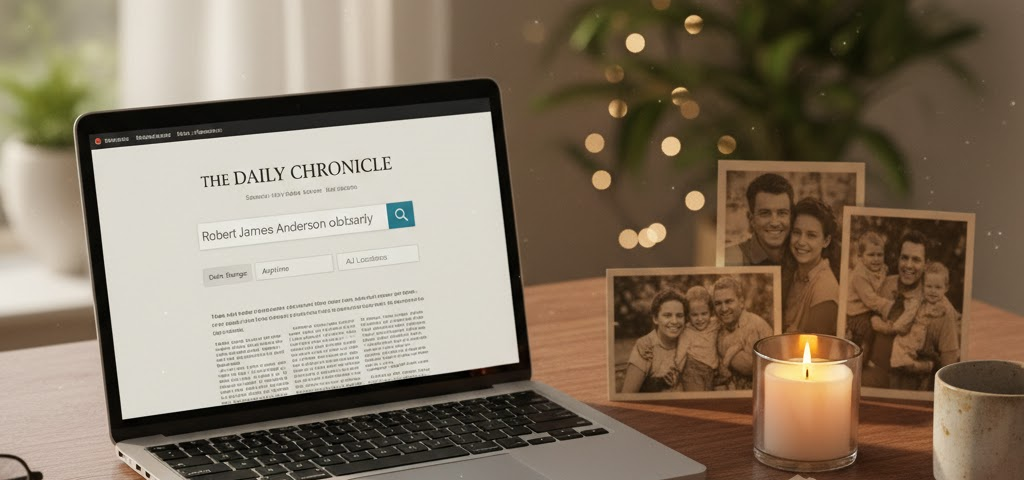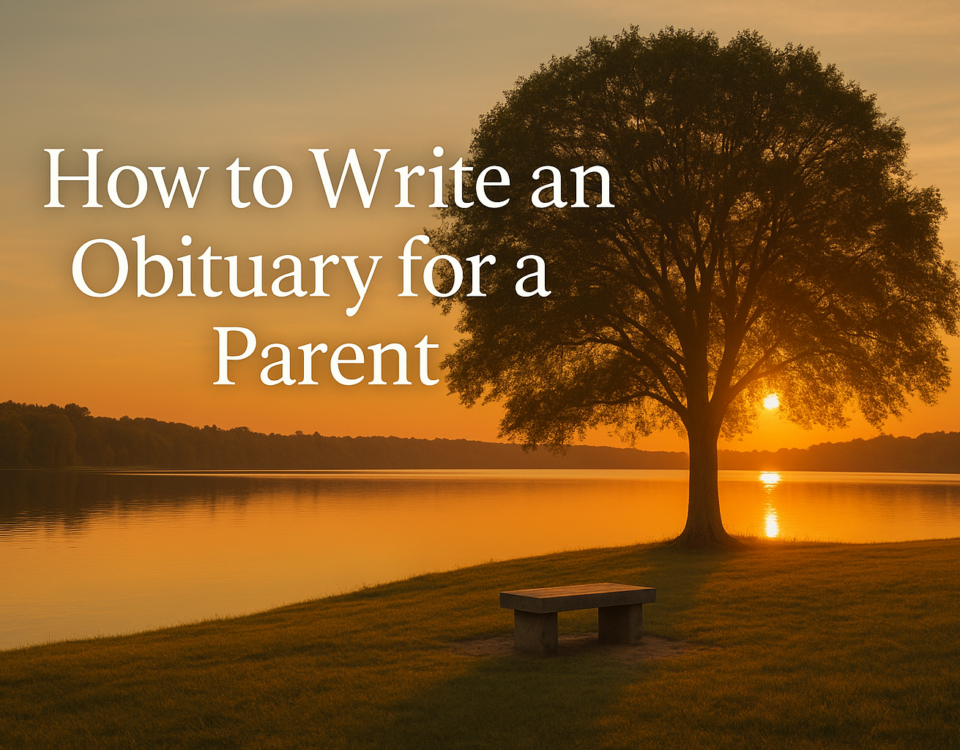How to Find an Obituary for a Specific Person (Step-by-Step Guide)

Old Testament Scriptures for Funerals: Comfort and Hope from God’s Word
October 24, 2025Obituaries do more than announce a death. They tell stories. Capture lives. Preserve what mattered to someone.
Maybe you’re tracking down family history. Or saying goodbye to someone you lost touch with years ago. Sometimes you just need closure, and that’s why obituaries are important.
The internet changed everything about how we search for these records. What used to take weeks at the library now happens in minutes. But only if you know where to look.
This guide shows you exactly how to find an obituary for a specific person, whether they passed recently or decades ago. You’ll get the best tools, search strategies, and expert tips that actually work.
Step 1: Gather Key Details Before You Start Searching
Don’t just type a name into Google and hope. Start with what you know. The more specific your information, the faster you’ll find what you need.
Essential details to collect:
- Full legal name (including maiden name if applicable)
- Approximate date of birth or death
- Last known city or county
- Potential newspaper that might have published it
- Names of close family members
- Any nickname they went by
Here’s something people miss: spelling variations matter. A lot. “Katherine” versus “Catherine” can lead to completely different results. Same with “Smith” versus “Smyth.”
Write down every variation you can think of before starting your digital obituary search; it saves time later.
Step 2: How to Find an Obituary Online (Free & Paid Options)
Most recent obituaries live online now. Older ones? Those take more digging.
How online obituary databases work:
They pull from newspapers, funeral homes, and public records. Some are free. Others charge for access to premium archives.
Major sources include:
- Large newspaper databases that partner with local papers across the country. You’ll find recent deaths here, usually going back 20-30 years.
- Genealogy and family history sites that specialize in older records. These often have digitized newspapers from the 1800s and 1900s.
- Funeral home websites that post their own obituaries. These are usually the most current and accurate.
When you’re ready to search, use filters. Enter the full name, approximate date, and location. That narrows things down fast.
Also, put names in quotation marks for exact matches. “Robert James Anderson” finds that exact phrase instead of every Robert, James, and Anderson separately.
This is where how to find an obituary online gets easier once you understand the tools.
Step 3: Best Online Obituary Search Tools and Databases
Not all obituary search tools work the same. Some excel at recent deaths. Others shine for historical research.
For Recent Obituaries:
- Local newspaper websites post death notices within days. Start there if the person passed recently.
- Funeral home sites get updated first. They often post before newspapers do.
- Modern memorial platforms aggregate obituaries from multiple sources. One search covers dozens of funeral homes.
For Older Records and Genealogy:
- Government archives hold death certificates and cemetery records. Public records go back further than most newspapers.
- Historical newspaper collections digitized old papers. You can find obituary by name and location from the 1700s onward in some cases.
- FamilySearch and similar databases focus on genealogical records. Free to use, massive archives.
International and Regional Options:
Immigrant families need specialized tools. Look for databases specific to countries or ethnic communities. Irish records differ from Italian records differ from Polish records.
Understanding public obituary records search versus private genealogy databases matters here. Public records are free but harder to navigate. Private databases cost money but organize everything better.
For serious family tree work, obituary lookup for genealogists requires patience and multiple sources. Cross-reference what you find.
Funeral directors use obituary search for funeral homes to verify information and coordinate with families. Same tools, different purpose.
Step 4: Where to Find Death Notices Beyond the Internet
Some obituaries never made it online. Especially older ones.
Check offline sources:
Public libraries keep local newspaper archives on microfiche. Yes, it’s tedious. But you’ll find things that aren’t digitized yet. County courthouses maintain death records. Ask the clerk’s office. They’ll point you to the right department.

Cemetery offices have burial records. If you know where someone is buried, start there. They often have dates and family information.
Local funeral homes keep records going back decades. Call them directly. Explain what you’re looking for. Most will help if they have the information.
Historical societies and genealogical groups preserve community records. Volunteers there love helping with research.
This is where to find obituaries when the internet comes up empty. Old-fashioned legwork still works.
Step 5: What to Do If You Can’t Find an Obituary
Sometimes there just isn’t one. And that’s okay.
Common reasons obituaries don’t exist:
The family chose privacy. Not everyone publishes death notices.
No one paid for it. Obituaries cost money. Some families can’t afford them or don’t see the value.
Records got lost. Fire, flood, poor recordkeeping. Especially with older deaths.
They went by a different name. Nicknames, married names, legal name changes. You might be searching for the wrong version.
What to try next:
Expand your date range. People often remember years wrong. Search five years before and after your estimated date.
Try alternate spellings. Use wildcards if the database allows it.
Contact funeral homes in the area. They keep records even if nothing was published.
Check social media and online memorial pages. Facebook groups for specific towns or families often share information.
Reach out to genealogical societies. They specialize in tracking down difficult records.
Historical societies might have unpublished records or photos.
Keep trying different combinations of information. One small detail can break the search open.
Tips for Funeral Homes & Genealogists Using Obituary Search Tools
For Funeral Directors:
Online obituary lookups help verify information quickly. When families come in with partial details, a fast search confirms dates and names.
Cross-reference what families tell you. Memory fails, especially when the person is going through grief. Digital records provide accuracy.
Keep your own funeral home’s obituaries updated online. Families search for these years later.
For Genealogists:
Obituaries contain gold for family trees. They list relatives, maiden names, birthplaces, and migration patterns. Save everything. Screenshot, download, print. Websites change. Records disappear.
Note the metadata: publication date, newspaper name, city. That context matters later.
Look for patterns across multiple obituaries in a family. They reveal community ties and historical events.
Cross-reference obituaries with census records, birth certificates, and marriage licenses. Build a complete picture.
Join genealogy forums specific to your research area. Other researchers share sources and strategies.
Consistent record-keeping separates successful research from wasted effort. Organize as you go.
Memorial preservation matters beyond your own family. Consider contributing records to public databases.
Writing or Updating an Obituary: Next Steps After Your Search
Found what you were looking for? Or maybe you didn’t find anything at all.
Either way, you can create or update a lasting tribute.
Writing an obituary doesn’t require professional experience. Just honesty and care. Start with the basics: full name, dates, survivors. Then add what made them unique.
Stories matter more than credentials. What did they love? Who did they love? What will people miss most?
If an existing obituary feels incomplete, some memorial sites let you add updates or memories. Also, there are obituary writing services.
The most important thing is to create something permanent that honors their memory. Even a simple online tribute can make a difference.
Honoring a Legacy Beyond the Obituary
Finding an obituary is just the beginning. It opens doors to understanding someone’s life. Where they lived. Who they loved. What they did.
From there, you can build something bigger. Family gatherings that share stories. Photo albums that preserve faces. Traditions that continue their values.
Grief looks different across cultures. Some traditions emphasize public mourning. Others prefer private reflection. Understanding these differences helps.
The stages of grief aren’t linear. You’ll circle back. That’s normal.
Pre-planning of the funeral and obituary can ease future burdens. Knowing what someone wanted prevents family disagreements later. An obituary captures one moment, but remembrance is ongoing.
Preserving Life Stories for Future Generations
Every obituary is a thread in a larger story. When you find an obituary for a specific person, you’re not just satisfying curiosity. You’re preserving history. Connecting generations. Keeping memories alive.
Future family members will search for these same records someday. Make sure they’re findable. Accurate. Meaningful.
Document what you know now. Write it down. Upload it to family history sites. Share it with relatives.
Stories disappear when no one tells them. You have the power to prevent that. Start with one person. One obituary. One life worth remembering. The rest follows from there.


